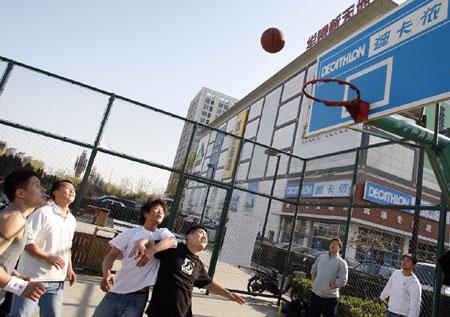
Playing basketball free of charge outside a Beijing Decathlon store. The Paris-based sports goods supermarket chain has opened 23 outlets in 12 Chinese cities and is ready to launch 10 new premises in 2010. Some outlets have been able to attract crowds and even entire families during weekends with their free facilities for customers to play and learn through practice. [Zhang Wei / for China Daily]
Experiencing sport is seen as key to Decathlon's success
BEIJING - They don't believe in advertising. They don't believe in big-name sponsorships. They don't seek a high profile presence. But their individual approach to retailing is having an impact. They are making quick inroads into the mass market in China.
In 2003, Tom Meng and his staff have being trying hard to build and blend their service into China's new urban middle class lifestyle. Now Decathlon, a France sports goods supermarket chain for which Meng is chief executive officer for the company's China business, has opened 23 outlets in 12 Chinese cities and is ready to launch 10 new ones in 2010 - without a "penny" being spent on TV commercials.
Some outlets have been able to attract crowds and even entire families during weekends to play basketball in its free-of-charge courts, to repair bicycles they have bought there, to test ping-pong equipment, to choose between hundreds of types of sports clothes and accessories, before they sit down to have a snack.
"I play basketball with my friends at Decathlon every Saturday afternoon because it's near my home. I also go inside to check the new goods and buy useful things for my picnic trips," said Cheng Xi, a 25-year-old IT engineer in Beijing.
Shop-front basketball courts are just one of Decathlon's marketing tricks. To make way for different "experience" areas, from ping-pong to golf, all outlets are spacious, between 2,000 and 4,000 square meters in size, even in cities such as Beijing, Shanghai and Guangzhou where property prices are astronomical. The largest Decathlon supermarket in China opened last month in Huamu, Shanghai. It has 5,000 square meters of room over two floors.
A large operating space is a priority for managers when selecting a location. As a result, many of them are not in traditional downtown areas.
Apart from opening up "experience" areas, Decathlon also sponsors sports events every month in residential neighborhoods near its outlets, especially for youngsters, giving many of them their first taste of activities popular in developed economies, from roller-skating to rock-climbing. Free coaching is provided at these events.
It's a win-win tactic for Meng and his team. They believe in personal experience. They believe in word of mouth. They expand through person-to-person networks. "Experiential marketing is our specialty," Meng said.
"Experiencing brings people closer to sports and to our sports goods. And their experience also brings in their family members, friends and colleagues. That is a much more effective way than advertising," he explained.
Meng says to be successful globally means people must be the best locally. "If you're not the local best, you will lose, even though for a moment you may be the largest and perhaps the strongest in the world," he said, reiterating head office views.
As a result Decathlon China emphasizes family and family happiness, a view it has maintained ever since it first expanded into China. It concentrates on Chinese fitness preferences - light to moderate exercises such as ping-pong, badminton, tennis and golf rather than more robust sports. As such it doesn't sell gym equipment.
In another strategy, the company is going to start taking measurements of its shoppers in key Chinese cities in order to design sportswear that fits better, Meng said. Chinese people's feet, for example, tend to be wider and shorter than those of Europeans so shoes made for the European market are unsuitable in China.
Consumer feedback is also important. The redesigning of swimming goggles was promoted by Chinese consumers' criticism that the old goggles were not tight enough and even leaky. Having found out that the cause was in the difference between Chinese and European noses, Decathlon developed MY SIZE goggles, which have seven sizes to fit what Meng claims is 99 percent of all face shapes.
Price is also an issue. To win over the mass market in an emerging economy, products have to be cheap as well as stylish. The MY SIZE goggles were sold at 49 yuan a pair, much cheaper than any other European brands sold in China.
Meng said he would expect more customers visiting his shop by bicycle rather than driving a Porsche. "Our products are not specially designed for the rich. We're trying to make them affordable for those who make even as little as 600 to 700 yuan a month, and to keep doing so for the next decade," he said.
Best value goods are given blue labels. The best-selling products are usually the first ones to have their prices lowered and be given blue labels. Flexible pricing is also part of Decathlon's experiential marketing so it helps to be located away from expensive downtowns. As a trade-off for its lack of first-tier city downtown presence, Decathlon may find it easier to enter the market in the so-called second- and third-tier cities, even though in those cities, its sales revenues may be not be as high as in Beijing and Shanghai. The operating costs may not be as high either, Meng said.
Even corporate culture is designed to boost customer experience. At present, Decathlon has around 2,000 employees in China and they are all expected to be sports fans.





